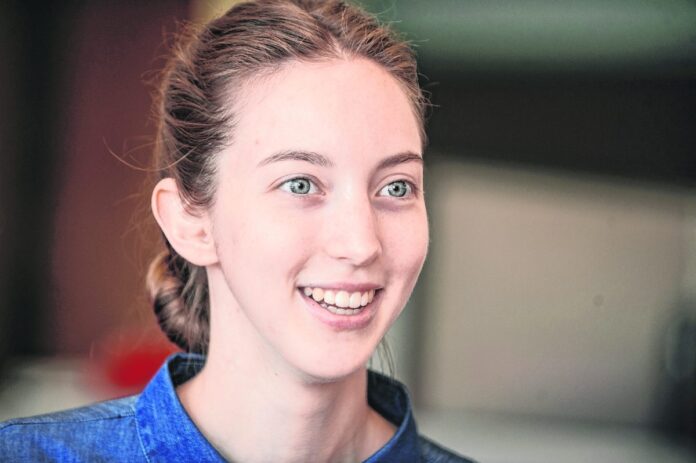
After spending a school year teaching the children of Syrian refugees in the heart of Beirut, Columbus’ Julia Bowling has no hesitation about going back to work with a classroom of students there this fall.
Bowling, 25, has spent the summer fundraising, including selling pecan pies, to raise money to go back to teach a second year at the Beirut Bridge of Hope, in Lebanon.
She says she is ready for a new school year and to share her Christian faith in the midst of the war-torn Middle East with a group of kindergarten and first grade-age kids.
“My first class was 20 kids and it was a challenge,” Bowling said of her arrival in Lebanon a year ago. “Many of them hadn’t been in school and they had so much energy. They were not used to sitting in a chair. They definitely have a lot of spirit.”
[sc:text-divider text-divider-title=”Story continues below gallery” ]Click here to purchase photos from this gallery
Last fall, Bowling was considering enrolling at Indiana Bible College close to home or the opportunity to teach a year in Beirut after attending a session about the Lebanon school at the Apostolic Tabernacle of Edinburgh.
Beirut Bridge of Hope founders Toufic and April Azar and their family spoke at the church about the Syrian refugee crisis and the need to help families who had fled to Lebanon from Syria.
Syrian refugee children age 5 to 8 may attend the school to learn math, English and Arabic writing. Intrigued, she looked into the school further and decided it would be her destination.
Bowling said her first task upon arrival was to learn just how much her students already knew.
“Technically, the students I had were first graders, but as I worked with them, it was really more late kindergarten,” she said.
As she was learning about her new students and their skills, she was also adjusting the a new culture in a foreign country.
When she arrived in Lebanon a year ago, she described the culture change as sort of that “crazy feeling you get being in a city halfway around the world.”
“It’s sort of a shock, but not really a shock,” she said. “One of the first things I noticed on the highway as we were driving to the school, when we got off on the exit, there were tiny children, really little children, tapping on windows trying to sell things — bottles of water or scraps of things to make money.”
Bowling did have somewhat of a language barrier when she arrived, which was also a challenge. Her students embraced her limited knowledge of their language as she taught them English. When encouraging the students to help each other on classroom work instructions, the communication problem soon eased, she said.
However, Bowling said she eventually had to counsel her students to not take it to the point of doing the work for each other, which began happening when some students wanted to be especially helpful to their fellow classmates.
“Sometimes they took that further than I wanted them to,” Bowling said. “They just said, ‘I’ll do it for you.’ “
Through the year, Bowling learned the little bits of conversation that eased a classroom instructional day, “Yes,” “No,” “upstairs,” and one word in their language she used a lot, “hurry.”
“They loved it, they thought it was hilarious that I was learning their language, when I was teaching them English,” Bowling said.
One little girl, who traveled on a later bus to go home, told “Miss Julia” that they would reverse roles and she would be the language teacher and “Miss Julia” would be the student until the bus arrived. The little girl carefully copied down her homework in Arabic explaining it to her teacher as she completed it.
Through learning each other’s language and the day-to-day interactions, Bowling said she bonded with the children and their family’s stories. And while she had a familiar Hoosier comfort zone that she held on to, she found herself enjoying the chance to explore and branch out into a new culture.
There were funny moments — at Thanksgiving, Bowling learned that in Lebanon, there is no canned pumpkin. And she now plans to pack some cream of tartar for baking, another staple that just isn’t found in Beirut.
But on a happy note, Bowling was able to buy a sewing machine in Lebanon, something she treasures.
“It’s kind of like I got so far out of my comfort zone, that I don’t know if I will ever get back there,” Bowling said. “The people, their faces, their smiles … I just wanted to make the most of every moment.”
When she wasn’t teaching, Bowling had a chance to do some sightseeing, exploring a land she described as being “so full of history at your fingertips.”
While American tradition is to put its history under glass and behind exhibit ropes and fences, Bowling said in Lebanon that visitors may simply walk through many ancient sites, touching whatever you wish. She explored massive temples and the layers upon layers of buildings underneath them, guided by the Azars, and even spent some time fairly close to the Syrian border.
The ongoing war in Syria did have an impact on the student enrollment at Beirut Bridge of Hope. Bowling may have started out with 20 students, but only had nine or 10 by the end of the year.
Some of the students went home to their home country of Syria, others transferred to other schools closer to their homes in Beirut.
“Parents move kids from school to school, depending on how they are supporting their families,” Bowling said. Some can’t afford bus fees to get the children to school. A lot of kids went back to Syria. And some families just couldn’t make it in Lebanon anymore and had to return.”
Some of the goodbyes were abrupt — a student would be in class one day, and not return the next day.
“For some, there was no notice. We just never saw them again,” Bowling said.
Bowling said the families she met on her visits to her student’s homes in Beirut were eye-opening.
Among her students, there was evidence of surviving war-torn conditions in Syria and living with the aftermath. Some of the children require hearing aids due to being under constant bombing which has damaged their hearing. Bowling says most of the kids will go to a “fight or flight” response quickly even when at school to any perceived danger, believed to be a response to living in a war zone and being bombed.
“They are ready to defend themselves if necessary,” she said. “On the whole, you could never guess what these kids have been through. When you see them at home, you learn they have nothing. But you wouldn’t know that from the way they arrive at school — they are dressed and ready to learn.”
Despite continuing U.S. State Department cautions and warnings about Americans traveling to the region, Bowling said she is committed to trying to help the Syrian refugees in Lebanon provide an education for their children.
“What little we do can change these kids’ lives forever,” Bowling said. “They will have a more realistic view of Americans. I’m praying we are changing their perceptions.”
“These people, they are just like us. They didn’t choose this,” she said of being a refugee in a foreign country. “These mothers have the same goals for their kids as we do. They want so much for their children.”
[sc:pullout-title pullout-title=”How to help” ][sc:pullout-text-begin]
A gofundme page has been set up to help Julia Bowling in her teaching mission at the Beirut Bridge of Hope school in Lebanon.
To learn more, visit gofundme.com/Build-A-Bridge-of-Hope
To learn more about the school, visit bbhope.org.
[sc:pullout-text-end]




